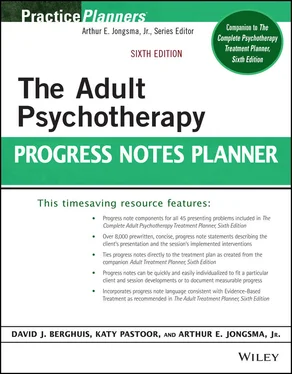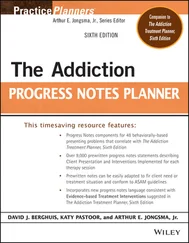37 Assign Homework on Exposure (37)The client was assigned homework exercises to perform exposure to feared stimuli and record his/her/their experience.The client was directed to listen to the taped exposure session to consolidate his/her/their skills for exposure to feared stimuli.The client was assigned situational exposures homework from Dialectical Behavior Therapy in Clinical Practice (Linehan, Dimeff, and Koerner).The client's use of exposure techniques was reviewed and reinforced.The client has struggled in his/her/their implementations of exposure techniques and was provided with corrective feedback.The client has not attempted to use the exposure techniques and was redirected to do so.
38 Treat Posttraumatic Stress Disorder (PTSD) (38)The client was identified as having a comorbid PTSD diagnosis.The client was treated with prolonged exposure therapy.The client was treated with cognitive processing therapy.The client was treated with eye movement desensitization and reprocessing (EMDR).The client's PTSD symptoms have significantly decreased, and positive reinforcement was provided for this.The client's PTSD symptoms have not significantly decreased, and additional treatment in this area was coordinated.
39 Encourage Trust in Own Evaluations (39)The client was encouraged to value, believe, and trust in his/her/their evaluations of self, others, and situations.The client was encouraged to examine situations in a nondefensive manner, independent of others' opinions.The client was encouraged to build self-reliance through trusting his/her/their own evaluations.The client was reinforced for his/her/their value, belief, and trust in his/her/their own evaluations of self, others, and situations.The client was redirected when he/she/they tended to devalue, disbelieve, and distrust his/her/their own evaluations.
40 Encourage Positive Experiences (40)The client was encouraged to facilitate his/her/their personal growth by choosing experiences that strengthen self-awareness, personal values, and appreciation of life.The client was encouraged to use spiritual practices and other relative life experiences to help increase his/her/their positive experiences.
41 Teach Problem-Solving Skills (41)The client was taught specific techniques for problem-solving.The client was taught about defining the problem; brainstorming solutions; listing pros and cons; seeking input from others; and selecting, implementing, evaluating, and readjusting actions.Role-playing and modeling were used to apply problem-solving skills.The client was assigned the homework exercise “Plan Before Acting” from the Adult Psychotherapy Homework Planner (Jongsma).The client was reinforced for his/her/their positive use of problem-solving skills.The client has struggled to use problem-solving skills and was provided with remedial feedback in this area.
42 Conduct Transference-Focused Therapy (42)Transference-focused therapy was conducted using client-therapist communications.The client was assisted in understanding split representations of self and difficulties with self-control.The client was taught about how to integrate split representations of self and develop more effective means to self-control.
43 Conduct Schema-Focused Therapy (43)Schema-focused therapy was conducted with the client.The client was assisted in learning and changing entrenched, self-defeating patterns.The client was focused on the relationship with the therapist and daily life outside of therapy.The client was assisted in exploring early developmental experience that included trauma.
44 Conduct Mentalization Therapy (44)Mentalization therapy was conducted with the client.The client was assisted in learning to interpret the actions of self and others through meaningful and understanding examination of mental states such as desires, needs, feelings, beliefs, and reasons.
1 1The numbers in parentheses correlate to the numbers of the Behavioral Definition statement in the companion chapter with the same title in The Complete Adult Psychotherapy Treatment Planner, Sixth Edition, by Jongsma, Peterson, and Bruce (Hoboken, NJ: Wiley, 2020).
2 2The numbers in parentheses correlate to the number of the Therapeutic Intervention statement in the companion chapter with the same title in The Complete Adult Psychotherapy Treatment Planner, Sixth Edition, by Jongsma, Peterson, and Bruce (Hoboken, NJ: Wiley, 2020).
CHILDHOOD TRAUMA
CLIENT PRESENTATION
1 Physical/Sexual/Emotional Abuse (1) 1 The client reported that he/she/they had a history of physical, sexual, or emotional abuse.The client reported that painful memories of abusive childhood experiences are intrusive and unsettling.The client reported that nightmares and other disturbing thoughts related to childhood abuse interfere with his/her/their sleep.The client reported that his/her/their emotional reactions associated with the childhood abusive emotional experiences have been resolved.The client was able to discuss his/her/their childhood abusive experiences without being overwhelmed with negative emotions.
2 Neglect Experiences (2)The client reported a history of parents who were neglectful of his/her/their emotional and physical needs.The client's feelings of low self-esteem, lack of confidence, and vulnerability to depression are related to his/her/their childhood experiences of neglect.The client stated that his/her/their parents were involved with substance abuse and this led to neglect of their child-rearing responsibilities.The parents' involvement in work and their own self-centered experiences led to neglect of the children.The client reported that his/her/their parents had limited intellectual capacity and failed to comprehend the full responsibilities of parenting.The client was able to discuss his/her/their childhood experience of neglect without becoming overwhelmed with negative emotions.
3 Chaotic Childhood History (3)The client described his/her/their childhood history as chaotic, related to frequent moves, substitute caretakers, financial instability, multiple parental partners, and the in-and-out presence of stepsiblings.The client described growing up in an alcoholic household, which led to significant instability.The client described one of his/her/their parents as seriously mentally ill, resulting in multiple periods of hospitalization and instability at home.The client described his/her/their parents as irresponsible and antisocial, leading to many legal and interpersonal conflicts.The client identified that he/she/they have been able to move on from his/her/their experiences of chaos in his/her/their childhood.
4 Repressive Parents (4)The client described his/her/their parents as rigid, perfectionistic, and hypercritical, resulting in him/her/them consistently feeling inadequate.The client reported that his/her/their parents were threatening and demeaning, resulting in feelings of low self-esteem.The client reported that his/her/their parents were hyperreligious, resulting in rigid, high expectations of behavior and harsh discipline.The client described an emotionally repressive atmosphere at home during his/her/their childhood as a result of his/her/their parents' lack of nurturance, encouragement, and positive reinforcement.The client has been able to overcome the effects of his/her/their parents' repressive parenting style.
5 Irrational Fears (5)The client's early-life experiences have led to continuing irrational fears in the present.As the client has developed insight into conflicts related to his/her/their childhood, his/her/their irrational fears have begun to diminish.The client reported a greater sense of security and an absence of previously held irrational fears.
6 Suppressed Rage (5)The client reported that his/her/their early painful experiences have resulted in feelings of anger and unexpressed rage.The client has begun to express suppressed feelings of rage toward his/her/their parents for their treatment of him/her/them during childhood.The client's level of anger has diminished and he/she/they reported a greater sense of peace.
Читать дальше












